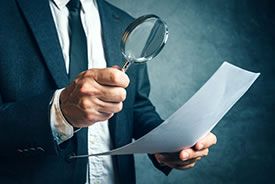Financial misstatement and misappropriated assets are issues that arise in a number of legal actions, including civil litigation, bankruptcy claims and criminal trials. Forensic accounting experts — typically Certified Public Accountants (CPAs) or Certified Fraud Examiners (CFEs) — may be hired to provide expert testimony supporting fraud allegations. But what is the expert's role in these cases?
Fraud Expert DOs and DON'Ts
The Association of Certified Fraud Examiners manual clarifies that a forensic accounting expert's role is to give opinion testimony, based upon their specialized knowledge and experience about case issues. However, experts may only give opinion testimony in areas that will aid the jurors in reaching their verdict. CFEs are strictly prohibited from offering legal conclusions or educating juries on principles of law.
The ACFE Code of Professional Ethics further explains that an expert will obtain evidence or other documentation to establish a reasonable basis for any opinion rendered. But experts can't express an opinion regarding the guilt or innocence of any person or party.
Forensic Accountants in Ponzi Scheme Cases
A review of Ponzi schemes can help demonstrate what financial experts bring to fraud cases. Ponzi schemes are a type of investment fraud made infamous by Bernie Madoff, the stockbroker who was sentenced to 150 years in prison for stealing roughly $65 billion from hedge funds, charities and other investors.
Madoff's scheme is the largest fraud in the history of Wall Street, spanning two decades and involving nearly 5,000 investors worldwide. Big or small, all Ponzi schemes enrich the promoter at the expense of unsuspecting investors. Other common denominators include:
- Lack of legitimate business purpose or wealth creation,
- Increasing insolvency over time,
- Returns to early investors paid through subsequent investor contributions,
- Promises of above-market returns,
- Focus on recruiting new investors,
- Variety of accounts used to co-mingle, recycle or convert funds, and
- Little or no assets available for liquidation after the scheme is revealed.
All of these elements must exist in order to prove a Ponzi scheme. A forensic expert's role is to analyze an alleged scheme and provide information that proves (or disproves) the fraud allegations. Experts provide unbiased, objective testimony that helps the judge or jury decide the case.
Plaintiffs and defendants alike can hire forensic accounting experts. For example, a defendant accused of running a Ponzi scheme hired a forensic accounting expert, who provided data that showed that his client might not be solely responsible for the scam. In the end, all of the principals were found guilty of taking monies from investors, not just the client.
Bottom Line
In Ponzi schemes and beyond, forensic accounting experts can provide valuable testimony for both the accuser and the accused. But experts have their limits. Attorneys and clients can get more from expert witnesses if they understand the legitimate scope of their analyses and testimony.
SERVICE SPOTLIGHT
Forensic Accounting & Fraud Examination
Discovery or suspecting employee theft is one of the most devastating things a company owner can experience. Besides financial loss, the news of such a betrayal can elicit emotional toll and stress. It’s times like these when forensic accounting firms are vital for your peace of mind as well as financial well being.

